The K-State 2025 Strategic Action Plan recognizes that, “in order to become a top 50 public research university in today’s world, our land-grant mission of education, research, and engagement must be global in nature and embedded throughout our campus culture.” The university works towards this vision in many ways, including by helping get its students, faculty, and researchers engaged abroad and working to bring more international perspectives—as well as more international undergraduate and graduate students—to K-State. By fostering and supporting international opportunities and working to build more relationships abroad, internationalization is a key component to the work of many students, faculty, and staff in the university community.
As a common element across the university-wide and college departmental plans, internationalization is also the focus of an aligned K-State 2025 Internationalization Strategic Action Plan. This plan (pdf) seeks to, “infuse internationalization in all we do in order to ensure that K-State students, faculty, and staff are prepared to live, learn, and work in the global community.” In order to accomplish this goal, the university must foster opportunities for K-Staters to engage directly with these communities near and far. The ability to think and operate across different spaces, cultures, sectors, and disciplines—and engage multiple ways of thinking and being—will be critical to tomorrow’s global thinkers and actors. The world is diverse and complex, but it is full of beauty and wonder to those willing to think differently, engage its many perspectives, and process things in multiple ways. For instance, in order to process the true beauty of a place like Ecuador—with its rich natural and cultural diversity—it requires the lens of both a scientist and an artist. And this is precisely the type of global thinking that K-State hopes to foster through its internationalization efforts.
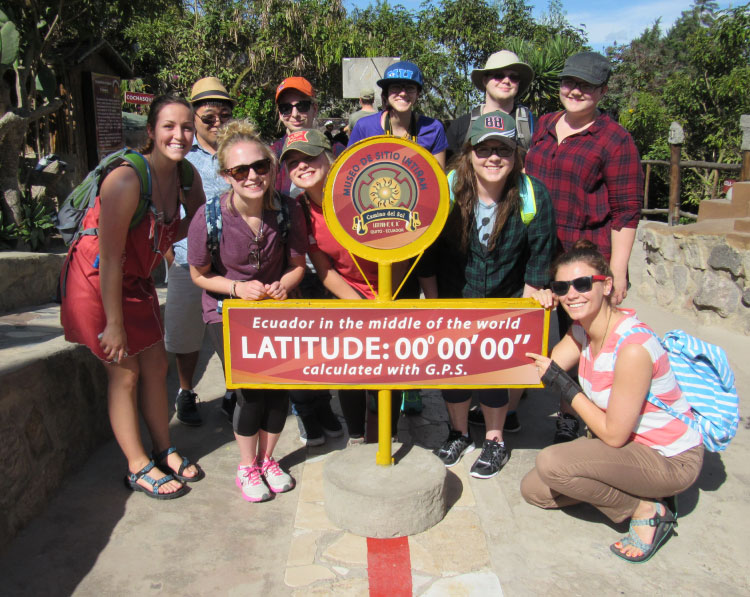
Students pose by the marker at the equator during the May 2016 Intersession experience, "Galápagos and Ecuador: Exploring Environment and Creative Writing at the Center of the World." The equator was first identified by French researchers in an area just outside Quito, Ecuador during the 18th century. "We also discussed how the equator is 'the center of the world' because of the astonishing level of biodiversity there," said Tiffani Lawrence, senior in secondary education-English and in theatre-dance option. Walking along the equator was only one highlight of this faculty-led Study Abroad experience. "We went to a high-altitude rainforest, hiked a pre-Inca trail, swam with sea turtles and sea lions, and saw plenty of endemic species, which means they are only found in one place on Earth." Lawrence said.
For most, the completion of finals is a sure sign that the semester of academics is quickly fading away. However, for others, the end of the semester is an opportunity for scholarly endeavors to expand outside the realms of the traditional classroom and laboratory. During the May 2016 Intersession, a group of students embarked on the "Galápagos and Ecuador: Exploring Environment and Creative Writing at the Center of the World" Study Abroad experience, lead by faculty Elizabeth Dodd, professor of English and Martha Smith Caldas, professor of biology. The students found themselves surrounded by the splendor of volcanoes, paradisiacal beaches, lush rainforests and unique ecosystems. The faculty-led program was designed in a way that the study of biology and creative nonfiction writing became merged as a collective discipline. “Within university structures, the arts and sciences are often separated so far as to be housed in different colleges. We insisted, every day, that the values of both disciplines could enlighten new experiences,” Dodd said.
During the two-week travel experience, the creative writing course allowed students to nurture their writing within the personal essay format. This approach benevolently allowed students to reflect upon their individual experiences as they were immensely aware of their surroundings, actively taking field notes, and allowing their five senses to run wild. “Writing creative nonfiction demanded that students explore and express their own wonder in ways that rejected easy cliché or superficial thought,” Dodd said. Students were challenged to veer away from writing about things they already knew and believed, and instead, write about new discoveries.
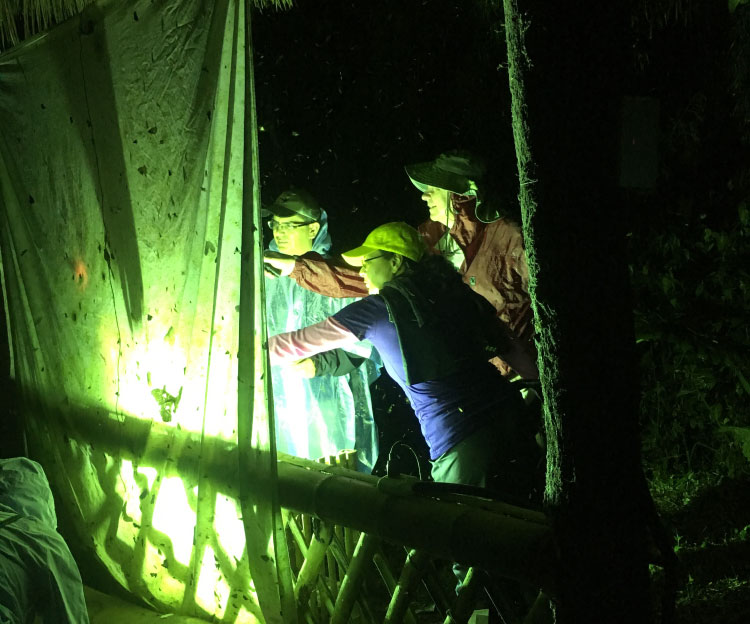
Students and faculty on the trip inspect the netting outside their shelter, where they were joined by unique moths and other insects throughout the night. This night time wildlife became the subject of one student's creative writing from the experience.
“One of the students wrote a personal essay that connected her interest in lucid dreaming with the nighttime wildlife we encountered in the cloud forest during our stay at the Maquipucuna Cloud Forest Reserve just outside Quito, especially giant moths and the bats that feed on them,” Dodd said.
Before an excursion into a cloud forest located in the western Andes, David Rintoul, professor of biology and a teaching assistant on the trip, had each student research three birds that could be spotted within the habitat. With the direction of a tour guide, students were able to use their knowledge and hone in on the birds that caught their sight, identifying them by their appearance and calls. “One student identified a hummingbird by its song. She heard the sound and said, 'I know what that is!' Rintoul said.
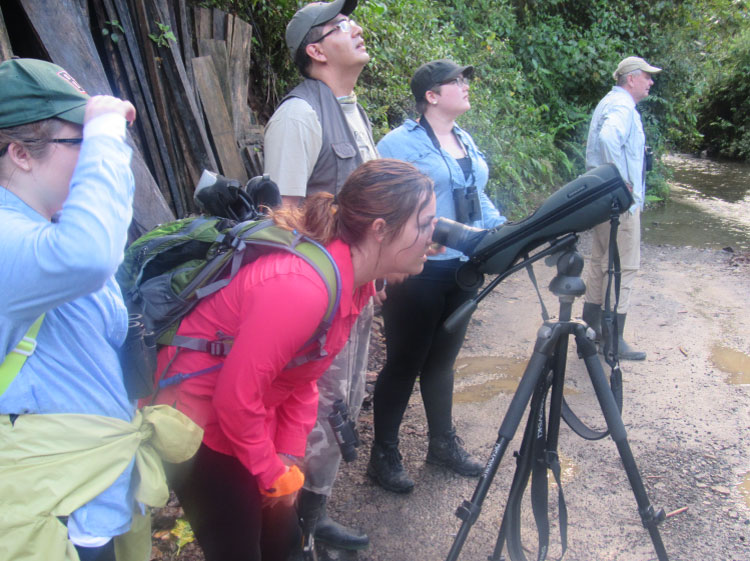
Students on the trip work to spot and identify birds along the trail. They are assisted by a local guide and Dr. David Rintoul, professor of biology. Before the trip, Rintoul assigned the students the task of researching some of the species of birds they might see there. They learned their names, details on where they might be found, and even had the chance to listen to some of their calls. Throughout their journey into the rainforest, students used their eyes and ears to identify some of these species in their natural habitat.
Visiting the island of San Cristobal, students marveled at the sight of sea lions, giant tortoises, blue-footed boobies, and other unique wildlife. The group visited a blue-footed breeding colony, and after observing the strange, slow dance performed by the birds, one student wrote a satirical discussion of mate selection. “Drawing on what we learned about mating strategies of the blue-footed booby—she offered a pointed cultural critique,” Dodd said.
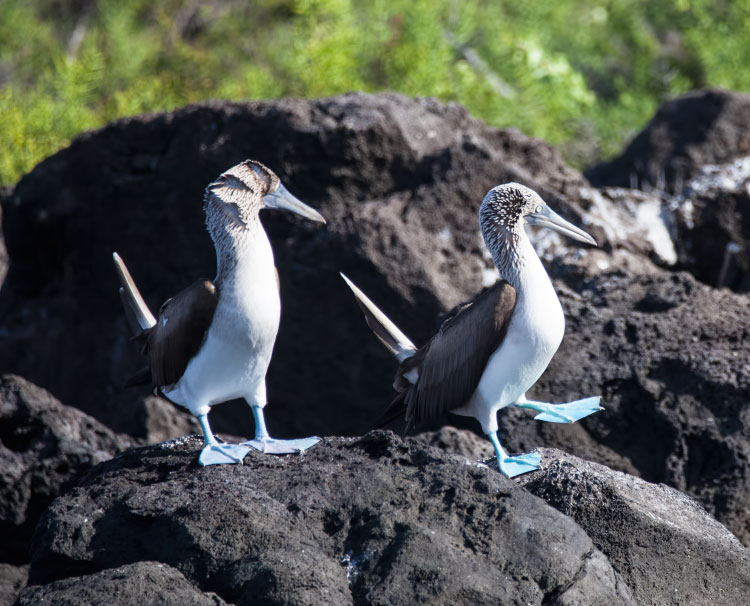
Two blue-footed boobies spotted along the beach engaging in their unique mating dance. This photo was captured by Dr. David Rintoul during the Study Abroad experience in Equador. You can see more of Dr. Rintoul's photos in his photo album from the trip.
Whether actively studying the diverse fauna and ecosystems, capturing the collected moments into personal essays, admiring the architecture of museums and cathedrals, or delighting in the captivating landscapes—students grew in knowledge in their areas of study and gained a better understanding of self, others, and the much larger, more-than-human world. “International experiences benefit the students in numerous ways. Students are going to have to deal with a global perspective in their future careers, and the study abroad trips change how the students look at the world,” Rintoul said.
Another essential element of K-State’s goals around internationalization is to bring global perspectives to the university and grow the number of international students receiving degrees. While studying ecotourism in Ecuador, K-State Assistant Professor of Park Management and Conservation, Dr. Jeffrey Skibins, met Andres Leon-Reyes on a visit to Universidad San Francisco de Quito. “It all started with meeting Professor Skibins, who got me interested in pursuing my doctoral degree at K-State,” said Leon-Reyes. The K-State Department of Park Management and Conservation prepares professionals to wisely manage shared spaces for recreation and contributes research to help these professionals optimally balance both the use and protection of scarce natural resources. “I was truly amazed to see that Kansas State University had a whole department dedicated to my field of interest,” said Leon-Reyes, who is now engaged in ecotourism research with Dr. Skibins as part of his doctoral program. “I was very pleased with the offered curriculum and the knowledge of K-State’s professors.”
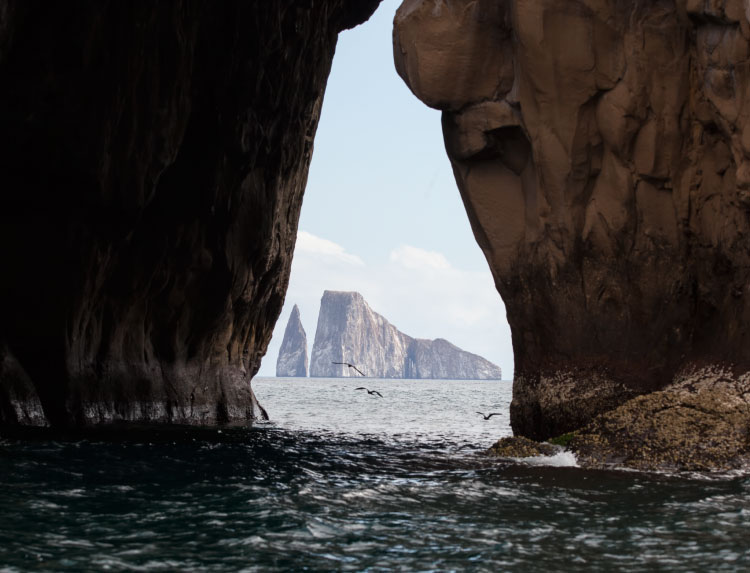
The iconic "Darwin's Window" in the Galapagos Islands, photo by Dr. David Rintoul.
Due to the vast biodiversity of Ecuador, it is considered to be one of the world’s megadiverse countries. This makes it one of the favorite destinations for ecotourist travelers from around the world. “It is a country that has abundant natural resources but has limited knowledge in regards to managing these appropriately,” said Leon-Reyes, “And this is what motivated me to pursue my doctoral degree.” Adequate resource management policies, development of appropriate infrastructure, training of local communities, and regulations to preserve the flora and fauna hot spots are examples of some of the improvements cited by Leon-Reyes which will be required in order to make ecotourism sustainable. “I believe that research which will lead to better results in managing the abundant—but not unlimited—resources in Ecuador, or in any country, will make a difference,” he said. So, as more engagement takes place between Kansas State University and the global community, the research of Andres Leon-Reyes will help improve the quality and sustainability of eco-travel for future K-Staters, the future of his home country, and the future of all who seek to experience some of the most amazing places on Earth.
K-State’s shared strategic commitment to internationalization has been carried out by students, faculty, and staff across the university, including a growing number of faculty who are engaged in international experiences. Over the first five years of K-State 2025, faculty-led study abroad proposals have increased by 50%. And, for the first time in its history, faculty-led international experiences have been made available in every college. K-State’s Office of International Programs supports this momentum by partnering with colleges and departments to administer programs and working to increase students’ awareness, access, and preparation for meaningful international experiences. As the list of opportunities grows, it will need to be matched by increased scholarship support to make these opportunities possible for every K-State student. Funds are available through the Study Abroad Office, their program partners, nationally competitive scholarships, and within the colleges and departments themselves. The Office of International Programs will continue to help students navigate these opportunities, and generous donors will continue to help make these opportunities accessible to more K-Staters. Because K-State’s mission is global in nature, it requires engagement with the broader world—to become a top 50 public research university and to continue preparing global thinkers for tomorrow’s challenges.
